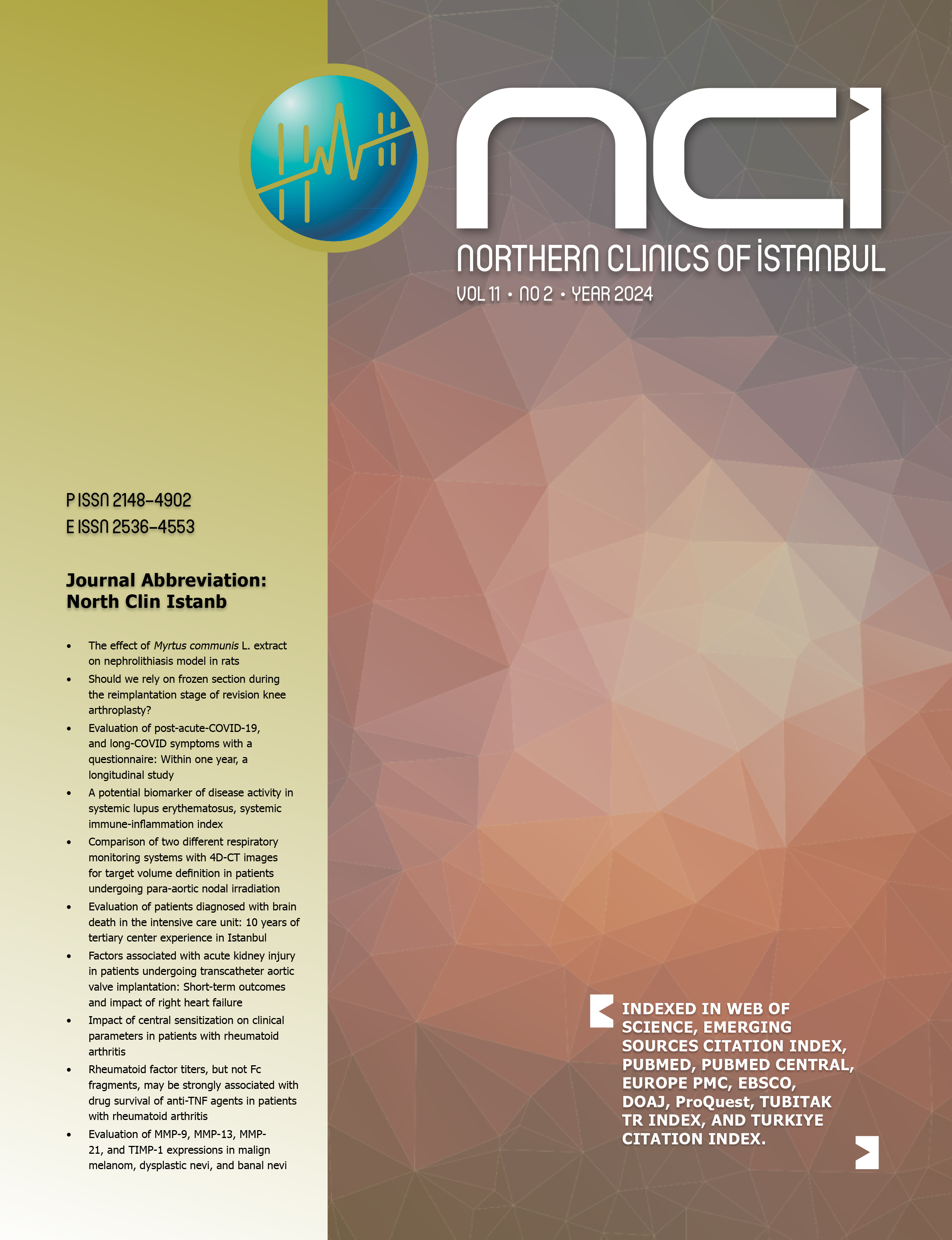The impact of adolescent acne vulgaris on CDLQI and DFIS: What does it depend on?
Defne Ozkoca1, Nazli Caf2, Tugba Kevser Uzuncakmak3, Aysenur Ozdil4, Ayse Nilhan Atsu51Department of Dermatology, Zonguldak Ataturk State Hospital, Zonguldak, Turkiye2Department of Dermatology, Diyarbakir Dagkapi Military Hospital, Diyarbakir, Turkiye
3Department of Dermatology and Venerology, Istanbul University-Cerrahpasa, Cerrahpasa Faculty of Medicine, Istanbul, Turkiye
4Department of Dermatology, Sisli Memorial Hospital, Istanbul, Turkiye
5Private Practice, Istanbul, Turkiye
OBJECTIVE: Acne vulgaris is a chronic and common disease among adolescents. The effects of acne vulgaris on the caregivers quality of life and its relationship to patients quality of life have been seldom studied. This study aims to investigate impact of adolescent acne vulgaris on the patients and their caregivers quality of life and to evaluate the relationship between these two variables.
METHODS: Acne vulgaris patients aged between 10 and 18 years and their caregivers were included in this prospective study. CDLQI (Children Dermatologic Quality of Life Index) and DFIS (Dermatological Family Impact Scale) questionnaires were used to assess the impact of acne vulgaris on the quality of life of patients and caregivers. SPSS version 21 was used for the statistical analysis; Spearman correlation test and Mann Whitney U test were used.
RESULTS: This study has shown a significant correlation between DFIS and CDLQI, between severity of acne and CDLQI, and between the previous use of systemic antibiotics and DFIS. There is no relationship of age, sex, disease duration, number of siblings, amount of money spent and previous treatment modalities to CDLQI. There is no relationship between age, sex, acne severity, disease duration, number of children and amount of money spent on DFIS.
CONCLUSION: Acne vulgaris not only has an impact on the patients quality of life but also on the caregivers quality of life, which in turn affects the patients quality of life.
Adolesan çağda akne vulgarisin CDYKİ ve DAEÖ üzerindeki etkisi nelere bağlıdır?
Defne Ozkoca1, Nazli Caf2, Tugba Kevser Uzuncakmak3, Aysenur Ozdil4, Ayse Nilhan Atsu51Zonguldak Atatürk Devlet Hastanesi, Cildiye Kliniği, Zonguldak2Diyarbakır Dağkapı Askeri Hastanesi, Cildiye Kliniği, Diyarbakır
3İstanbul Üniversitesi-Cerrahpaşa, Cerrahpaşa Tıp Fakültesi, Dermatoloji ve Veneroloji Anabilim Dalı, İstanbul
4Şişli Memorial Hastanesi, Cildiye Kliniği, İstanbul
5Özel Muayenehane, İstanbul
Giriş: Akne vulgaris ergenlik döneminde görülen kronik ve yaygın bir hastalıktır. Bu hastalığın ebeveynlerin yaşam kalitesi üzerine etkileri; ve hastanın yaşam kalitesiyle ilişkisi daha önce nadiren incelenmiştir. Bu çalışmanın amacı ergen akne vulgarisin hastaların ve ebeveynlerinin yaşam kalitesi üzerindeki etkisini araştırmak; ve bu iki değişken arasındaki ilişkiyi değerlendirmektir.
Hastalar ve Yöntem: On ile on sekiz yaş arası akne vulgaris hastaları; ve ebeveynleri bu ileriye dönük çalışmaya dahil edildi. Akne vulgarisin, hastaların ve ebeveynlerinin yaşam kalitesi üzerindeki etkisini değerlendirmek için CDYKİ (Çocuk Dermatolojik Yaşam Kalitesi İndeksi) ve DAEÖ (Dermatolojik Aile Etki Ölçeği) anketleri kullanıldı. İstatistiksel analiz için SPSS versiyon 21; Spearman korelasyon testi ve Mann Whitney U testi kullanıldı.
Sonuçlar: Bu çalışma DFIS ile CDLQI arasında; akne şiddeti ile CDLQI arasında; ve önceki sistemik antibiyotik kullanımı ile DFIS arasında anlamlı bir korelasyon olduğunu göstermiştir;. Yaş, cinsiyet, hastalık süresi, kardeş sayısı, harcanan para miktarı ve önceki tedavi yöntemlerinin CDLQI ile ilişkisi yoktur. Yaş, cinsiyet, akne şiddeti, hastalık süresi, çocuk sayısı ve DFIS'e harcanan para miktarı arasında herhangi bir ilişki yoktur.
Conclusion: Akne vulgaris sadece hastanın yaşam kalitesini değil aynı zamanda ebeveynin yaşam kalitesini de etkiler ve bu da hastanın yaşam kalitesinin daha fazla etkilenmesine sebep olur. (NCI-2023-9-5)
Manuscript Language: English





















